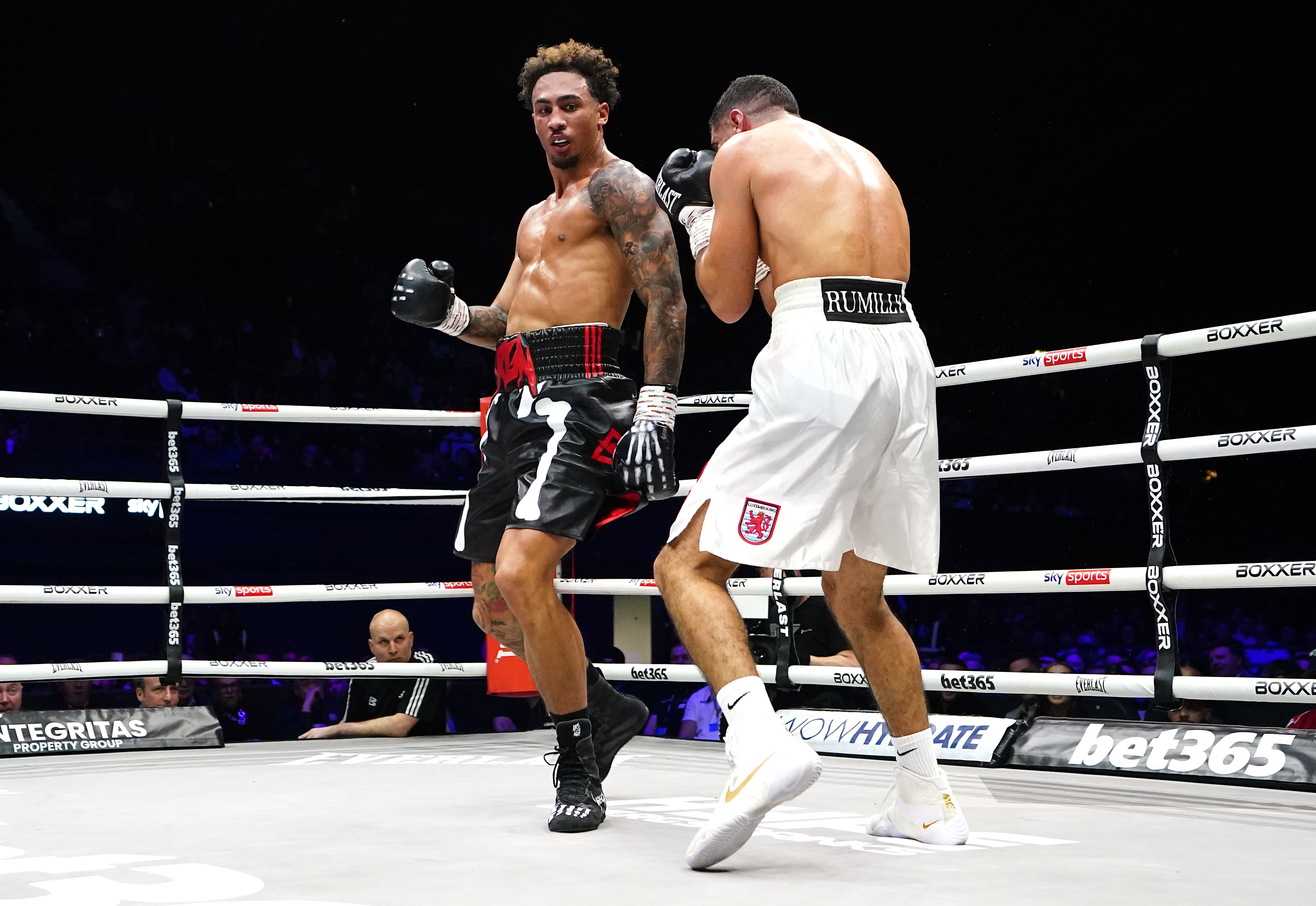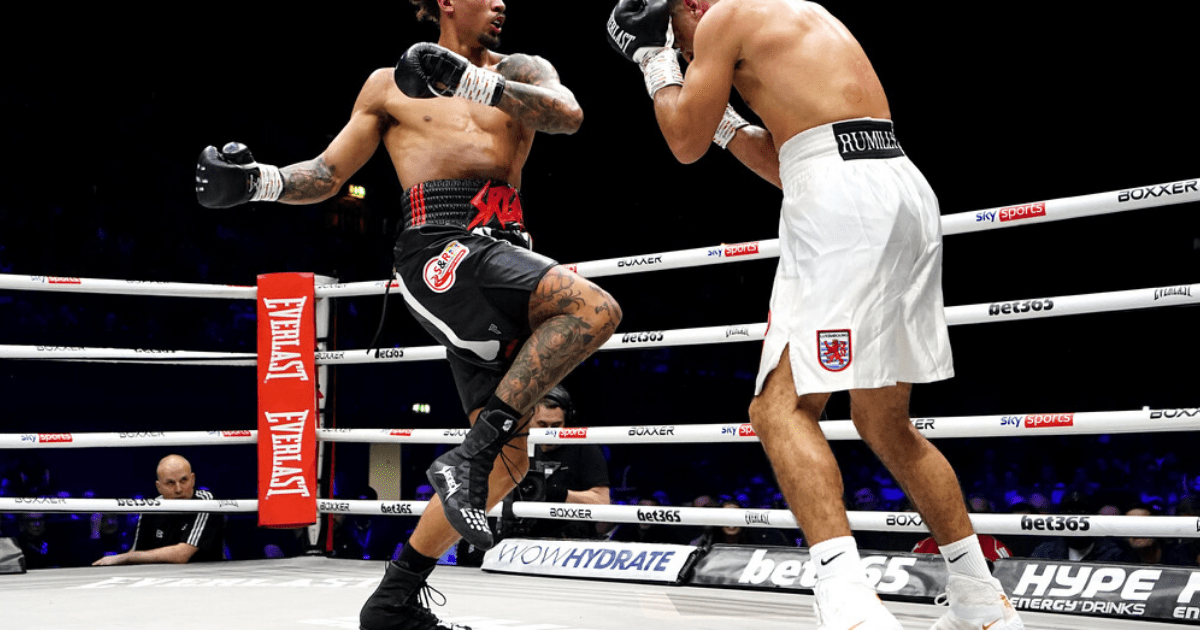Boxing fans are split on Ben Whittaker's flashy antics during his TKO victory over Khalid Gradia.
Whittaker, a rising star in the sport, didn't hold back when it came to showing off his personality in the ring. The 26-year-old Olympian hopped around on one leg, swaying from side to side and exaggerating his body movements throughout the fight.
At one point, Whittaker even spun around on one leg, which earned him a scolding from the referee. However, the crowd at Wembley's Ovo Arena loved every minute of his stunts, booing the official in protest.
Viewers at home had mixed opinions on Whittaker's in-ring antics, taking to social media to voice their thoughts. While some fans found the showboating entertaining, others felt it was unnecessary and embarrassing.
One fan wrote, "Moves are fine when it's flowing, but he seems to be overdoing it." Another commented, "Embarrassing to watch. Hopping around the ring against a bin man." Yet another viewer called it "disgraceful showboating," arguing that the purpose of being in the ring is to box, not dance.

However, there were also fans who praised Whittaker's unique style. One supporter said, "Ben Whittaker is a bit different. A right character and can box." Another added, "Ben Whittaker doing Ben Whittaker things ?."
After the fight, Whittaker addressed the criticism of his showboating. He emphasized that it should not be seen as disrespectful and explained his motivation behind it.
Whittaker told Sky Sports, "Do you know what it is? I can dance, I can shimmy, but I broke him down in a jiffy. I was going through the motions, looked at my dad and he was a bit annoyed, so I said 'alright, let me show you what I can do' and I got the job done.
"Don't take the showboating as disrespect, it's just my art. People can compare me to Prince Naseem, but I am Ben Whittaker."
Frequently Asked Questions
What equipment do you need to get started in professional Boxing?
Equipment essential for those who want to get into professional boxing include boxing gloves, mouthguards, headgears (for sparring) and the right footwear. For technical training, a heavy bag, a speed bag, a double-end bag and other aids are essential. It’s crucial to use quality equipment that offers protection and durability, as subpar gear can increase the risk of injury.
What age can you learn to box professionally?
Professional boxing has age restrictions. Most boxing commissions require that boxers be 18 years or older to compete professionally. Although there is not a set age limit for the upper age bracket, factors like physical capability and health will naturally limit what age one can safely and effectively compete. It’s crucial for older athletes to be thoroughly assessed for fitness and risk before taking up the sport professionally.
How long will it take me to become a boxer professional?
The time needed to become a professional fighter can vary greatly. The length of time to become a professional can be affected by the person’s initial skill level, his or her ability to adapt and their training. On average, it could take several years of dedicated training and successful amateur experience before one is ready to turn professional. However, some exceptional talents might advance more quickly, while others may need more time to develop.
How do boxers keep their weight in check and manage their weight classs?
Boxers control their weight through a strict diet and a precise training regime. Dieticians work with boxers to create a diet that allows them to achieve their weight-class target without sacrificing energy and nutrition. The importance of regular weight check-ins and regular exercise is crucial, especially in the run up to a fight. Weight management involves a strategic approach that, if not performed correctly, can result in health problems and/or poor performance.
What are some of the most important components in a boxer’s training regime?
A boxer’s regular training routine usually consists of multiple key components. They include technical skill building, tactical drills and strength and conditioning. Sparring and mental training are also included. The tactical drills will help you develop your fight strategy. Technique-focused training improves punch accuracy, defensive maneuvers, and defensive techniques. Sparring and conditioning exercises provide practical combat experience. Mental training emphasizes confidence, focus, and resilience.
What are professional boxing’s risks?
Professional boxing, like any contact sport, carries inherent risks. This includes acute injuries like cuts, bruises broken bones and head trauma as well as chronic conditions such as concussions or neurological disorders. While proper training, safety equipment and compliance with boxing regulations can reduce the risks, they will never be eliminated. Accepting and understanding these risks are essential to choosing to box professionally.
How important is mental toughness in professional boxing?
Mental toughness in professional boxing is as crucial as physical conditioning. The sport requires mental toughness, resilience, and the ability of handling pressure. Mental preparation involves visualization, stress management techniques, and developing a strong mindset to confront the challenges within the ring. Without mental toughness in the ring, boxers may not be able perform to their full potential.
Statistics
- An analysis of boxing injuries suggests that 90% involve the head, neck, and face, emphasizing the importance of protective gear.
- A study showed that most professional boxers have spent more than 4 years in training before their first professional bout.
- Reports suggest that successful professional boxers can earn upwards of 50 times more than the median purse for entry-level professionals per fight.
- The average age for boxers to turn professional is between 18 to 25 years, though many continue to compete well into their 30s and beyond.
- Statistical data indicates that there has been a 15% increase in the number of professional boxing gyms over the last decade.
- Professional boxers typically train 4 to 6 hours per day, 5 to 6 days a week, depending on their fight schedule.
- As per recent surveys, only about 17% of professional boxers reach a title shot opportunity in their careers.
External Links
ibhof.com
wbcboxing.com
expertboxing.com
titleboxing.com
ringtv.com
usaboxing.org
boxingnews24.com
How To
How to prepare mentally for a boxing fight
Mental toughness, not just physical preparation, is the key to success in a boxing bout. Engage in regular visualization exercises, visualizing yourself achieving success in the boxing ring. Create a ritual to calm and focus your mind before a fight. You can strengthen your game plan by mentally practicing your strategy and tactics. Stay confident, positive and realistic but remain optimistic about the challenges that lie ahead. Meditation and breathing exercises can help manage stress and anxiety leading up to the fight.
Did you miss our previous article…
https://www.sportingexcitement.com/boxing/conor-benn-wins-scrappy-fight-against-little-known-american-peter-dobson/

